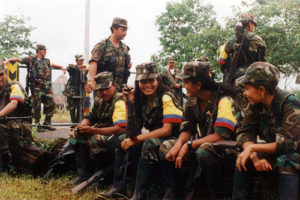FARC Militants Begin Transition to Civilian Life
Colombia’s largest militant organization, the Revolutionary Armed Forces of Colombia (FARC), has made the first big step in its transition to peace. On January 28, thousands of FARC guerrillas traveled across Colombia to 26 secure zones, where they will disarm and return to civilian life in the coming months. The migration fulfills a central component of the 2016 peace agreement between FARC the Colombian government and brings Colombia one step closer toward bringing to an end the longest running conflict on the continent. Photos of the journey, published by Semana, show smiling guerrillas aboard buses and boats as well joyful reunions between fighters and their families and friends for the first time in years.
Photos of the journey, published by Semana, show smiling guerrillas aboard buses and boats as well joyful reunions between fighters and their families and friends for the first time in years.
Sergio Jaramillo, the High Commissioner for Peace in President Juan Manuel Santos’ administration, spoke of the warmth with which guerrillas greeted him as they arrived at a demobilization camp in northern Colombia. According to Santos, some enthusiastically shook his hand as a gesture of peace and hope.
At a meeting on January 17, representatives of FARC and the government agreed to the construction of health centers in the camps for pregnant women and nursing mothers.
El Tiempo described reunions between old friends as 210 militants arrived at a camp in the region of La Guajira in northern Colombia. However, it also reported the camp’s lack of health services, electricity, and medicine, all of which were promised by the government under the peace deal. Alirio Cordoba, one of FARC’s commanders, described the camp as “a haven without the minimum conditions of habitability.”
Although both the guerilla organization and the government have facilitated reintegration up to this point, the complete, peaceful transition to civilian life faces other challenges. The Wall Street Journal reported the efforts of First Capital Command (PCC), Brazil’s largest criminal organization, to recruit former FARC members. Between five and ten percent of FARC militants have refused to disarm.The PCC hopes to gain their military experience and leverage these new recruits to strengthen ties with Colombian cocaine producers.
Despite its promise to maintain good relations with the disarmed group, the Colombian government, under pressure from the populace, has embraced a more critical tone in addressing FARC’s previous offenses. The final peace deal included an agreement that guerrillas who confess to crimes will receive lenient sentences. However, President Santos revealed a possible point of continued contention in a strongly worded tweet on February 3, which stated that rebels’ crimes will be “investigated, prosecuted and punished.”
Despite images of seemingly peaceful reintegration and signs of a hopeful future, underlying tensions may continue to undermine the relationship between FARC and the government as their differences over amnesty and past crimes dominate public discourse.
